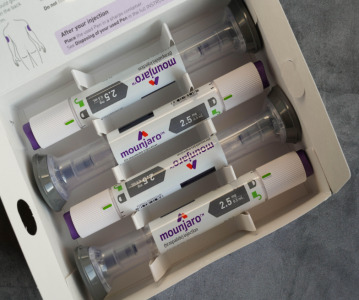FDA approves new indication for Novartis drug Afinitor for progressive, nonfunctional GI and lung neuroendocrine tumours

In advanced progressive, nonfunctional NET, Afinitor is the first approved treatment for patients with lung NET and the first oral therapy for GI NET.
Novartis has announced that FDA has approved Afinitor (everolimus) tablets for the treatment of adult patients with progressive, well-differentiated, nonfunctional neuroendocrine tumours (NET) of gastrointestinal (GI) or lung origin that are unresectable, locally advanced or metastatic. Afinitor received a priority review designation providing a shortened review period for drugs that treat serious conditions and offer a significant improvement in safety or effectiveness.
Afinitor is the first treatment approved for progressive, nonfunctional NET of lung origin, and one of very few options available for progressive, nonfunctional GI NET, representing a shift in the treatment paradigm for these cancers," said Bruno Strigini, President, Novartis Oncology. "We are proud of our Afinitor development program, which has translated to meaningful benefits for patients with several different cancers and rare diseases."
Neuroendocrine tumours are a rare type of cancer that originate in neuroendocrine cells throughout the body, and are most often found in the GI tract, lungs or pancreas. NET can be defined as functional or nonfunctional. Functional NET are characterized by symptoms caused by the oversecretion of hormones and other substances. Nonfunctional NET may be characterized by symptoms caused by tumour growth, such as intestinal obstruction, pain and bleeding for GI NET, and asthma, chronic obstructive pulmonary disease and pneumonia for lung . More than 70% of patients with NET have nonfunctional tumours. At the time of diagnosis, 5–44% (depending on site of tumour origin) of patients with NET in the GI tract and 28% of patients with lung NET have advanced disease, meaning the cancer has spread to other areas of the body, making it difficult to treat. Progression, or the continued growth or spread of the tumor, is typically associated with poor outcomes.
The approval of Afinitor was based on efficacy and safety data from a pivotal study (RADIANT-4) showing Afinitor reduced the risk of progression in patients with progressive, well-differentiated, nonfunctional NET of GI or lung origin by 52% (hazard ratio [HR] = 0.48; 95% confidence interval [CI], 0.35-0.67; p<0.001) vs placebo. Additionally, the data showed Afinitor increased median progression-free survival (PFS) by 7.1 months: median PFS by central review was 11.0 months (95% CI, 9.2-13.3) in the Afinitor arm and 3.9 months (95% CI, 3.6-7.4) in the placebo arm.
In the pivotal trial, the most common treatment-related grade 3/4 adverse events (AEs) (>=5%) for Afinitor and placebo, respectively, were infections (11.0% vs 2.0%), diarrhea (9.0% vs 2.0%), stomatitis (9.0% vs 0.0%), fatigue (5.0% vs 1.0%) and hyperglycemia (5.0% vs 0.0%).
Additional worldwide regulatory filings for this indication are underway, with a decision in the EU anticipated in 2016.
Related News
-
News The next 15 drugs up for negotiation with Medicare include several blockbusters
By now, everyone is quite familiar with the drug price negotiations taking place between drug companies and the Centres for Medicare & Medicaid Services (CMS) in the USA as part of measures being taken to reduce the cost of drugs for patients, to make ... -
News PSCI Welcomes Delpharm, Samsung Biologics, and Suven as First Supplier Partners
The pharmaceutical industry continues to evolve with an increasing focus on responsible sourcing, sustainability, and collaboration across the supply chain. Under a new model to recognise suppliers within the pharmaceutical and healthcare industry that... -
News Drug prices agreed upon as part of the US Inflation Reduction Act
The Inflation Reduction Act brought into constitution by the Biden administation in 2022, which proposed a drug price negotiation between the government and pharmaceutical companies, has reached it's first agreement. -
News Eisai Alzheimer’s drug authorised in UK but still faces obstacles
In partnership with BioArctic AB, pharmaceutical company Eisai has been granted Marketing Authorisation by the Medicines and Healthcare products Regulatory Agency (MHRA) for its Alzheimer’s disease drug product Leqembi. -
News Eli Lilly's weight loss drugs removed from the FDA's shortage list
The US FDA have recently updated their drug shortage list. The recently released list shows that all dosage forms of Eli Lilly's weight-loss drug Zepbound and their diabetes drug Mounjaro are now available. -
News Global advancements in the diagnosis and treatment of rare diseases: Rare Disease Day 2024
Rare Diseases Day is celebrated on the 29th February 2024 and represents the plight of rare disease patients to gain diagnosis and access to suitable treatment. -
News Pharmaceutical industry supports COP28 health stance in joint statement
As COP28 takes place over this week in Dubai, UAE, several bodies in the pharmaceutical and health industries have come together to announce support of key movements in sustainability in the sector, and to recognise sustainability as a health issue.&nb... -
News Biden backs Cold-War measures to shore-up medical supply chains
In a recent strategy to combat rising inflation and the cost of living crisis, President Joe Biden has invoked a Cold War-era act to increase investment in a selection of medicines and supplies.
Recently Visited
Position your company at the heart of the global Pharma industry with a CPHI Online membership
-
Your products and solutions visible to thousands of visitors within the largest Pharma marketplace
-
Generate high-quality, engaged leads for your business, all year round
-
Promote your business as the industry’s thought-leader by hosting your reports, brochures and videos within your profile
-
Your company’s profile boosted at all participating CPHI events
-
An easy-to-use platform with a detailed dashboard showing your leads and performance



.png)



